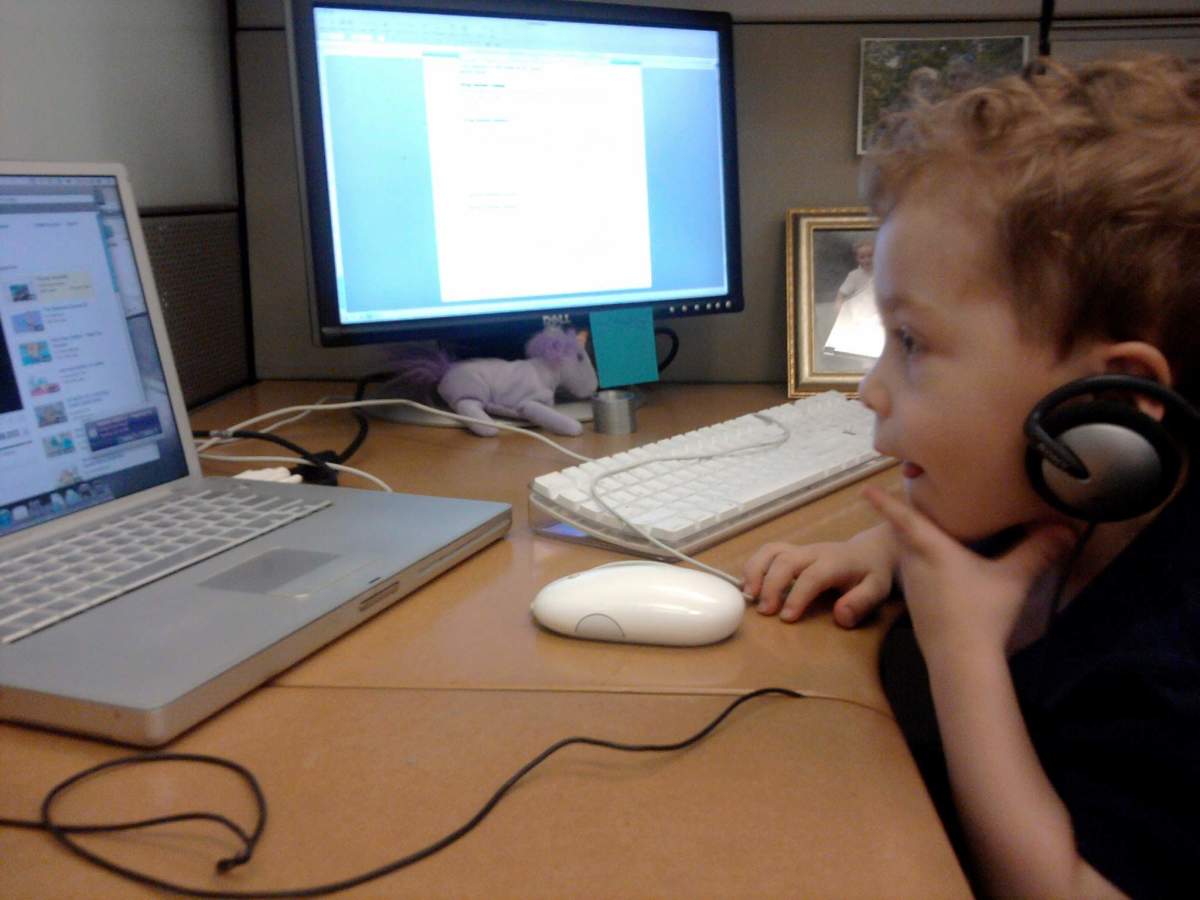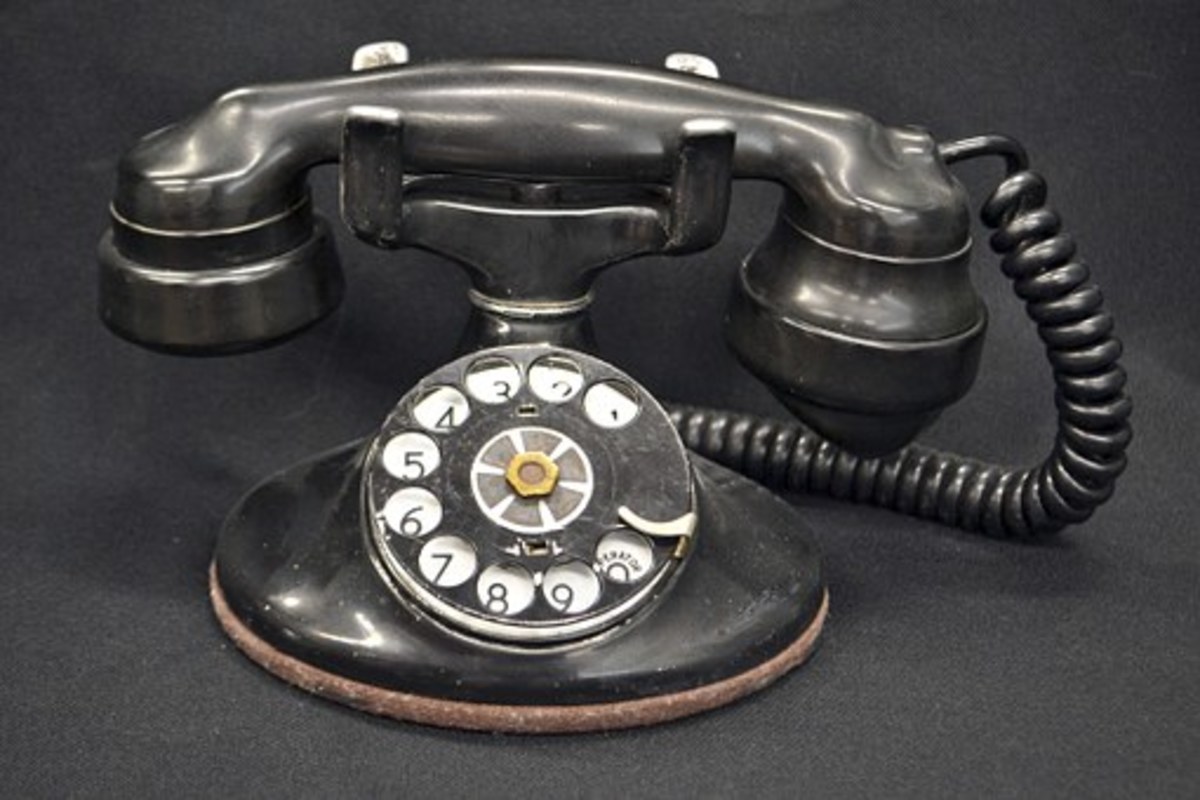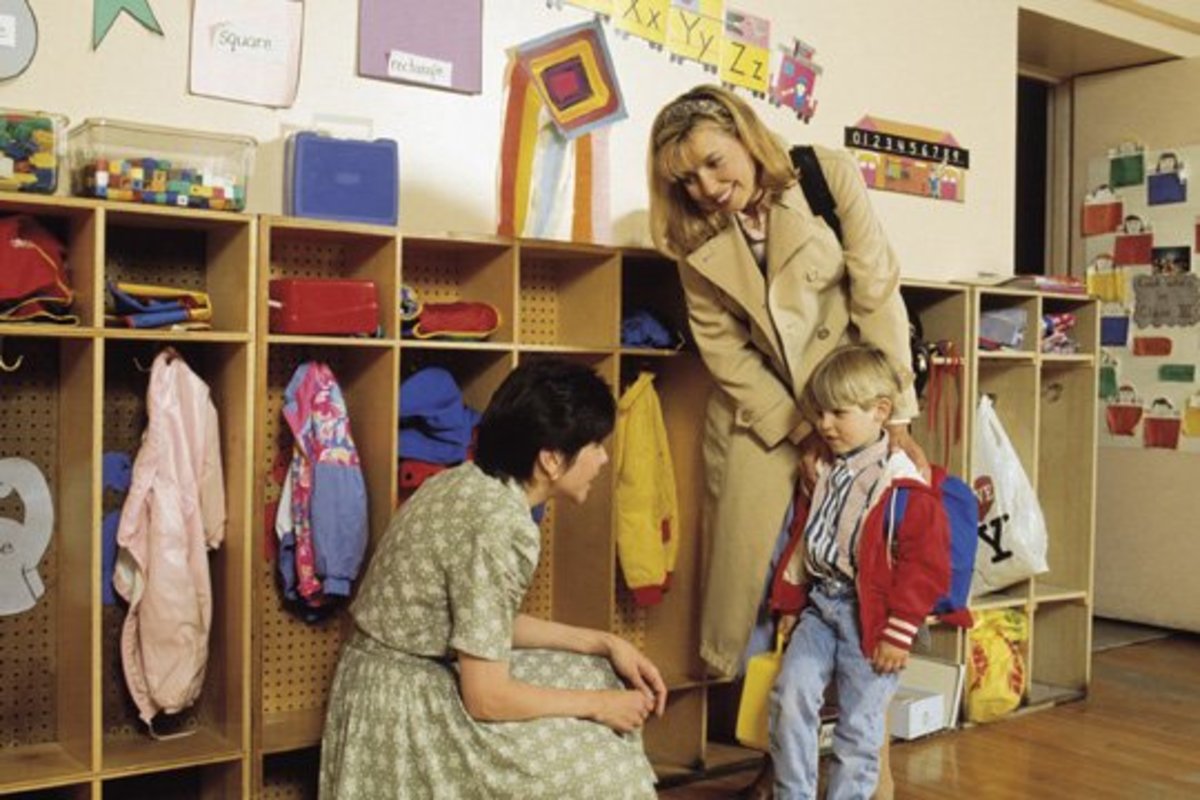Are Children Too Addicted To Screens? Just How Much Has Technology Changed Childhood?
I am a parent. I have two sons, one of which is almost 12 and the other who has yet to start school. Born in the 70s, I have seen society change quite a bit in the last forty years. I have lived a life filled with little technology, when compared to the world of instant communication we live in today. I can remember a childhood in which, if you weren't sitting around the box at the right time each day, you missed your programme. You couldn't record it or look it up on 'On Demand' or IPlayer. Television viewing was limited for children, unless you liked watching the 6 O'clock BBC News or the kind of evening shows your parents liked. There was no computer sitting in the corner of the living room, and no technology at all upstairs until I was older (unless you count an alarm clock). In fact, when I was a young child I don't think I had even heard of computers at all.
As I grew up, more and more technology began to seep into our lives. As an older child about to hit my teens, I remember the day we bought our very first (and very basic) PC for the home. Compared to today's counterparts, it really didn't do very much at all. I remember when we purchased our first video recorder and could record programmes we had missed, as well as renting movies from the shop. But even then, technology did not take over our lives in the way it does today. As children, we still did other things - because we wanted to, not because someone else turned off the screen. We were inventive, creative and free-thinking. We were sociable and much better at making something out of nothing. I know this, because I have observed the children I know today and I see the differences.
Technology Plays a Big Part in Childhood Today - But at What Cost?
There is no doubt that technology has changed the face of childhood, for better or for worse. The lure of ever-present technology is very tempting for young people - I have a 12 year old son, who is obsessed with computer games. In fact, he seems attracted to anything with a screen and buttons to press - if there is nothing else about he nags to 'play' on my phone. He has a lot of friends who he often socialises with outside of school - without exception, technology plays a huge part in their leisure time. When friends come to our house to see my son, they mainly want to play on computers or games consoles. They do not spend anywhere near the same amount of time playing outside as I used to when I was young. Sometimes, I don't even think they spend the same amount of time outside as I do now - a woman about to hit my forties. I would like them to, because I am of the mindset that an idyllic childhood means playing games and having adventures outside until the sun goes down. In fact, I try to throw them out the door, if the weather is good (not literally, of course). Sometimes they are seemingly enthusiastic and head off to the park with a football (they do like football). The problem is, they return after a short while (usually no longer than an hour), hoping for some more electronic entertainment. "We're exhausted" "It's too hot" "We need a drink" "Our feet hurt" are typical excuses for the early return. At my time of life, though, I know an excuse when I see it.
I think it's quite sad, however. As I look back to my own childhood, I can remember so many occasions on which we played outside for hours and hours, without much in the way of equipment aside from a bike or a scooter or a bat and ball. Playing outside was creative and the games we played were often dictated by how many children were present. It was very worthwhile coming up with great games to play, because the alternative was going home , indoors, and that was boring. Going indoors was something we did at the end of the day, when it was almost time for dinner (we called it 'tea' then). After playing outside for long periods of time, it was nice to relax on the sofa with the smell of grass and fresh air on our skin. The evening would be quite peaceful; there was little hyperactive behaviour since we had burnt off all our energy outside.
Sometimes, I bring this subject up with my son. When he is lurching from room to room, dying of boredom because I have decided enough is enough and have turned off everything that won't work without a plug or batteries, I explain exactly what childhood used to be like. 'Well, that was the old days,' I am told, in reply. 'It's the modern day now, it's how it is'. It might well be how it is these days, but I am totally convinced it is both less healthy (for both mind and body) and less fun.
Are Children Really So Very Different?
But are children really and truly any different today, or is it just a case of their leisure time being hugely affected by the society we all live in? As I fight to persuade my son and his friends that it is not healthy to spend all of one's spare time staring at a screen, it might appear that children today bear little resemblance to past generations. However, although children today seem to be very addicted to computers, televisions and electronic gadgets in general, when these gadgets are completely unobtainable I have observed that children do revert back to the type of behaviour more reminiscent of my own childhood. Take today's example - we went for a cycle ride in a local forest, where we biked through woods for two hours, followed by hot chocolate in the cafe then a play on the adventure playground (in the rain). Both of my children embraced the outdoors, used up a lot of energy and didn't want to go home at the end of it. It appears that, when technology is out of sight (i.e. miles away) it is out of mind as well. Camping trips generally have the same result, as do other days out away from home. I have seen my son and his friends embrace the art of den making, climb trees and become extremely enthusiastic over a make-shift rope swing which is, apparently, 'the best thing ever' to be stumbled upon deep in the pine woods. I would conclude, then, that children are inherently the same as they always have been, but the society we have all created has led to vast changes of behaviour and obsessions over new and widely marketed technology.
The trouble is, electronic entertainment is now so prevalent in so many of our modern homes that it is both too tempting and too accessible for children, especially older children. Older children often have easy access to so much technology that it is far too easy for them to go from one thing to another and clock up an unhealthy amount of time staring at a screen. Home computers, games consoles, tablets, Ipods (no longer is the Ipod more about the music than the apps), even mobile smart phones - all of these offer a wide range of entertainment which further lures children to spend even more time 'switched on'. Sometimes, the smallest gadgets are the worst - after all, presuming you have just turned off your child's games console or computer with strict instructions of 'no more', would you even notice if he was lolling in his bedroom, playing more games on his tiny Ipod? Not if he was like my son, you wouldn't - "I'm going to read a book," he tells me. I think that's great - good, traditional entertainment, and educational as well. How am I supposed to know the book is just for show and when I am not looking he's still playing games on something small enough to practically lose in the pages? And, whilst I have no desire to be a complete stick-in-the-mud, all of this screen time as children switch from one gadget to another can add up to an awful lot of hours.
It seems to me that, when children are surrounded by technology, it does come at the expense of other childhood pursuits. A lot of children, when left to their own devices with little parental input or insistence, would choose screen-based forms of entertainment over most other alternatives. I believe older children are the most effected - those who are growing out of the toy-playing stage - although children are developing a passion for technology at an ever-decreasing age. Most of the children that I know would choose computerised entertainment over traditional board games. Sometimes we play board games as a family, but it is always my idea and my oldest son is very unlikely to consider playing a board game with his friends. I can remember occasions playing board games with friends on many occasions, and so can my mother. It was a fun and sociable way to kill an afternoon. If I suggest this to my son, he says, 'Mum, no one likes playing board games. They just want to go on the XBox.'
Time For Reflection
One point I have definitely noticed with today's young generation is that they do not tolerate boredom - at all. Although I can certainly remember the torturous feeling of not having anything to do as a child, I can also recall how time spent suffering the pains of boredom often led to some of my most creative moments. Drawing, writing stories, making comic-like books and puzzle books for my younger sister to try out, even making my own board games on a new piece of card were activities that arose out of not having anything else to do. Even simply thinking was sometimes a valuable and creative activity - moments alone, just sitting, can help anybody of any age to reflect on and make sense of life. Besides, it is healthy for the mind to have some 'down time', occasionally. I can remember afternoons lying on my bed with absolutely nothing to do - perhaps a record whirring on the deck - and wondering and dreaming about all sorts of things.
Children today, however, seem to have an overly heightened fear of having nothing to do. It is almost as though they have hyperactive brains that can't do without the stimulation that electronic entertainment brings. Constant fast moving images on screens have already been linked with changes in young, developing brains - because the brain becomes used to this over-stimulation, it is thought children may become less able to concentrate on other tasks because of low attention spans. And although it might not seem that way sometimes, as your child lolls across the sofa with his feet on the cushions and barely moving, chances are they are very rarely doing absolutely nothing. In fact, doing nothing has almost become a dirty word. Children often seem to possess very 'restless' brains. They like to be constantly bombarded with entertainment created by somebody else. If TV is out of the equation, then silly videos on YouTube will do instead. Off on a car journey lasting more than ten minutes? Chances are, older children have stuffed the smallest of gadgets in a pocket to relieve the pain of just sitting there.
Let's face it, children never did like long car trips. "Are we nearly there yet?" was the bane of every parent's life - it was quite possibly asked every time the car turned a corner or passed another herd of grazing cows. But back in those days, there were other things one could do to pass the time. We had ISpy games and spent the journey seeing who could be the first to find all the items on their chart. Even without the charts, we played it anyway - the entire family would be involved and it became a social occasion. After all, shared games bond families, whilst electronic entertainment tends to do the opposite. Electronic entertainment has a habit of isolating the user from other members of the family - I can think of many incidences when my youngest child has been largely ignored or snapped at by his older brother just because he spoke to him when he was too absorbed in a screen to focus on anyone else.
Undesirable Content
And what about the content that children today are actually viewing? In my experience, a high proportion of today's young people are viewing material that is considered too mature for their age. As a parent, it can be more difficult than one might think to police such things - after all, what you strictly forbid in your own home is often easily accessible in someone else's (and often without your knowledge). Games seem to be much more violent and shocking than they ever were in the past - it is almost as though the next big release has to be that bit bloodier and more corrupt than its predecessors. Perhaps we now think of it as the norm - but I personally think that is a mistake, Yes, kids of a certain age have always wanted to be more 'grown up' and get their hands on material which isn't meant for them. But the boundaries have been heavily shifted and we, as a society, have become very complacent. In stores like Game up and down the country, there are young children being allowed to purchase games for adults which their own parents are taking up to the counter. Some of these games are worse than others, but nearly all of them are worse than their rivals from fifteen to twenty years ago.
Although I've never exactly been a 'gamer', I remember when the first Sega Megadrive came out. I remember very well, because my new boyfriend bought one and we would sometimes sit together and play - wait for it - Sonic the Hedgehog. At the age of twenty, a night in playing Sonic the Hedgehog, with a beer and something to eat was a perfectly fun way to pass the time. Innocent fun, albeit a bit immature, perhaps. Today, however, my own son - not yet a teenager - would be sure to turn his nose up at the harmless Sonic and Friends. It would not be exciting enough, edgy enough, or bloody enough for him. He would deem it a 'little kid's game'. Likewise for the very first Playstation the same boyfriend bought when it first came out. I remember innocent games with bubbles or balls, the cartoon-like Crash Bandicoot and a fighting game that could barely be compared to its graphic rivals of today. Back then, all of these games were enjoyed by grown adults - watch older teens in games stores today and you will see that, aside from the odd football game like Fifa, the menu is rife with bloody violence and corrupt morals which promote a skewed view on life.
My own son asked me to buy him a game that, apparently, all of his friends have - Saint's Row III. I refused, since it holds an 18 certifcate and, upon looking it up, I found that it contains a strip club with pole dancers. It doesn't look particularly revealing, but I don't believe that children should be introduced to such concepts via a game. Many parents, however, do not seem to hold the same view. My son was not happy. 'They have strip clubs in real life,' he pointed out to me. 'Maybe,' I replied, 'But you would not be able to set foot inside them.'
The think that is the crux of my argument. Games, although not real life, can introduce minors to elements of society that they should be much more ignorant about. Although the games are designed for adults, many parents allow their children to get their hands on them - thus making it easier for children who are not permitted the games to access them unknowingly at other people's houses. But, when subjects are first introduced to children via a computer game, what effect does it have on them? Do they consider it a 'normal' part of society; something that adults commonly incorporate into their daily lives? Many games now have references to drugs, prostitution and crime - do children grow up with a distorted view of the adult world? They certainly do not have a balanced view of such things, because they do not have any wisdom or experience of life to draw upon.
It isn't only games that can have an impact on our children's upbringing. The internet is rife with content that children used to be better shielded from. Recent newspaper articles indicate that a significant proportion of male minors have accessed pornography without their parent's knowledge. This is, alledgedly (and according to recent reports), having an impact on the way in which boys view girls and women - they can become desensitised to a woman's feelings and develop a lack of respect. Young people viewing explicit material may develop a warped sense of 'normality', because they more easily discover things that they shouldn't before they have the maturity to properly understand it.
The Incessant Accessiblity of Children's Television
I think that the easy accessibility that children have to screen-based entertainment must surely fuel a certain level of addiction. Children's television is now aired throughout the day (and sometimes the night, if you have satellite or cable channels). Because children know that a television programme is there at the press of a button at every instant of the day, they 'want' it even more. Think of it this way - if your favourite show was on all night long, instead of just for the ordinary 30 mins to an hour, would you stop watching and switch off? A lot of people, myself included, would probably choose to keep watching until bedtime. But, if the show wasn't on at all - in fact, if no shows we liked were on - we would have little choice but to find something else to do.
As a young child, I cannot recall a single occasion when my parents insisted I stopped watching television. Perhaps they were just very liberal. However, I think the truth is that we simply didn't watch as much TV. Young preschoolers could watch it for about 15 minutes at lunchtime, then that was it for the entire day. Older children could see about 90 mins after school if they arrived home in time, but then viewing was geared towards adults instead. Athough I am all for convenience, I actually think the old way was the best. If children are absorbed for too long in television, then they are missing out on other forms of entertainment. They are being passive, instead of creative, at a time when the brain is still developing. Imaginative, creative play is essential for the healthy mental development of young people, but the addiction of screen based entertainment for hours on end means that there is limited time or desire for anything else. 'Switching off' for certain periods of the day is very important - and sometimes it doesn't only affect the child who is actually watching TV or playing games. Younger siblings are hugely influenced by their older brothers and sisters - even though my four year old doesn't play computer games yet, his current preferred activity when he arrives home from preschool is to sit and watch his brother play the popular Minecraft game. He pulls up and chair and just sits there, while I am busy preparing dinner in the kitchen. 'Wouldn't you rather play with your toys?' I ask. 'No,' he tells me. 'Shall I put a programme on for you?' 'No. I love watching Minecraft.' All he wants to do at that moment is watch his older brother play a game and any attempt to drag him away results in a lot of fuss. I only remember his brother at a similar age - he hadn't even heard of computer games and played with age-related toys all the time. He didn't have the influence of older children and therefore it was much easier to control his environment.
The Physical Effects of Too Much Screen Time
When children spend too much time playing computer games, watching television or logging on to Facebook (very popular with older girls) they are not spending any time moving around and being physical. A lot of children still have interests and hobbies that they pursue in their spare time (after all, this is the age of the helicopter parent and the overly-structured kid's routine). However, even if a child pursues a sporting interest at a club for three hours a week, what about the rest of the time? When I was younger, I can remember that the streets were full of children of all ages, from the very small to teenagers. Kids rode their bikes outside, indulged in skipping contests, hung upside down on climbing frames, played ball games and hide-and-seek, climbed trees, rolled down grassy hills and played hopscotch. Now, for various reasons, children are much less likely to be playing unsupervised outside - popular reasons are said to be a heightened fear of abduction and concerns over traffic. But when children spend too much time sitting indoors instead of running about outside, it can have a physical impact. Child obesity is on the rise in both the UK, US and many other developed nations. Almost certainly, this is fuelled by both a decline in physical activity and an increase in unhealthy eating habits. Children often consume more calories than their peers in the past used to, but burn off less energy in play. The current obsession with screen based entertainment lends little support to this growing concern. There are many reasons why children do not play outside as much as they used to - sometimes the area where they live is considered 'too dangerous' by parents. However, all too often the children themselves choose to stay indoors, immersed in an alternative cyber world which can easily take over if left unchecked.
But spending time outdoors is incredibly important for both the body and soul. The benefits of being outside, especially in areas filled with nature, resonate deeply within us - children included. Being outside can even alleviate stress and depression, bringing about a more positive mindset. Just enjoying an afternoon in a nice park, wood or on the coast can encourage feelings of calm and peace. What's more, there is a suggestion that spending time outside, surrounded by nature, can prove beneficial to children with ADHD. Children are not supposed to spend their time sitting in a chair - they need to move about much more than adults do.
Children's Potential
I can't help but think that children who are addicted to screen-based forms of entertainment are missing some of their potential. Spending too much time in this way leads to a rather passive existence - basically, they are whiling away large quantities of time numbing their minds with something someone else has created. Electronic entertainment, whilst acceptable in sensible amounts, encourages apathy and procrastination, because children become so fixated by it that they don't want to do anything else. But if computer games, social media, television, Ipads, Ipods and their equivalents were suddenly taken away, it is quite likely that a lot of children would regain their imaginative and creative sides. Indulging in artistic and creative pursuits helps children to develop and explore the ideas inside their brains - a simple child's model might not seem very important, but creative skills can be developed into adulthood and even be used in future careers. Brilliant innovations come from creative minds. Likewise, the games that children play outside, just like in the old days, help to form a child's character. Think of the ways in which children learn to fit in with others; to socialise and to negotiate. Children who play outside with other children learn to work out issues which can help them turn into well-balanced, confident individuals. A child who learns to be a good negotiator can fit comfortably into a work-place setting. Unfortunately, staying indoors with a games console or the TV does little for the healthy evolvement of a young person's character.
There is little doubt that technology aimed towards children is here to stay. Used moderately, it can enrich the lives of young people, since information is found literally at the press of a button. However, young people today are often very addicted to screen-based entertainment, which can come at the expense of other aspects of their lives. Children today are also less protected than in the past, when it comes to mature and unsuitable content - and even though many parents might think they know what their children do online, this is not always the case, especially for older children and adolescents. An awful lot of children are more tech-savvy than their parents, who grew up without computers.
Childhood has definitely changed since the days when outside play on the streets was commonplace. Looking back to different times, I think that children have lost some of the magic that previous generations knew, and that is at least partly due to the ever-increasing amounts of technology present in our lives.








